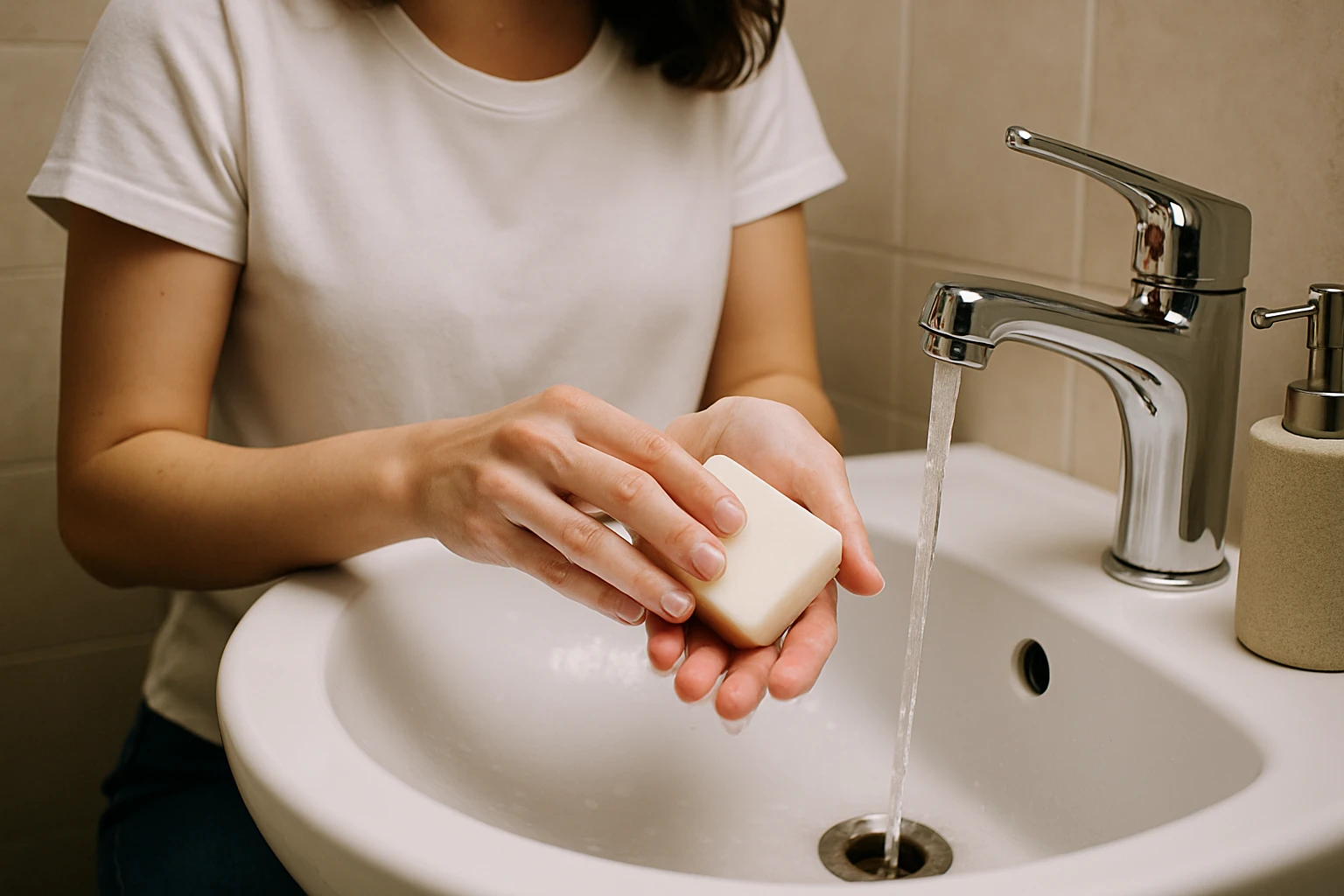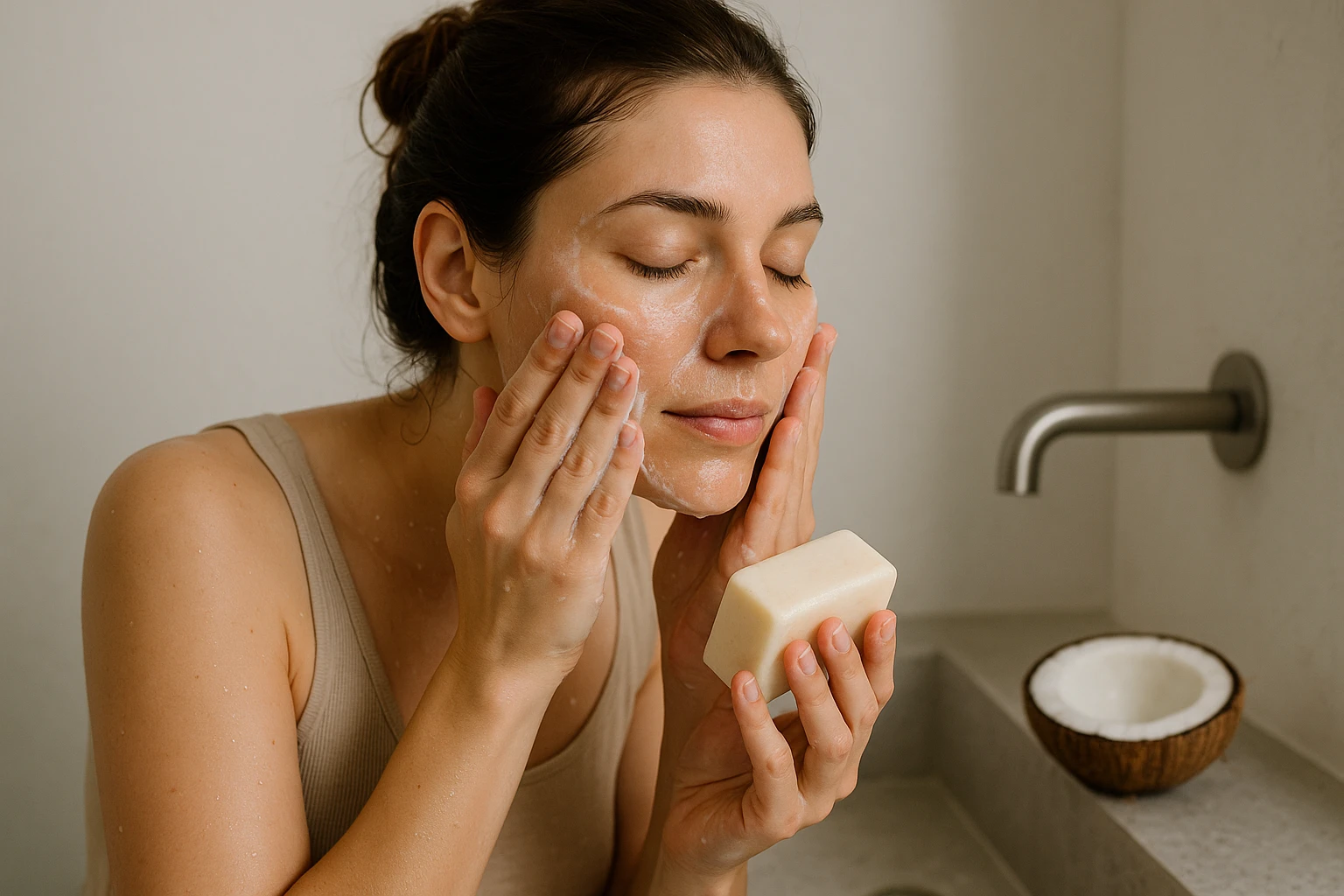Why Organic Coconut Soap Bar Is Great for Your Skin
on Nov 02, 2024Introduction
Imagine a simple swap in your skincare routine that not only pampers your skin but also supports your overall well‑being. That is the compelling promise behind choosing organic coconut soap. Before we delve deeper, consider how gentle, nourishing ingredients can transform your daily cleanse into a ritual of rejuvenation for your skin.
In today’s market, many conventional bar soaps strip the skin of its natural oils due to harsh additives like sodium lauryl sulphate or parabens. Studies show that such ingredients can disrupt the delicate pH balance, leading to dryness, irritation, and premature ageing Nature Buff Soap. In contrast, organic coconut‑based bars offer a nourishing cleanse that maintains moisture and supports skin health Kamicka blog.
Consider real‑world applications: one‑ingredient soaps made purely from organic virgin coconut oil are lauded by consumers for their hydrating and clarifying effects. Users often report smoother texture, reduction in eczema patches, and improved radiance after just a few uses Ensō Apothecary. This illustrates the potency of minimalistic, organic formulations in addressing sensitive, dry or acne‑prone skin.
This introduction lays the foundation for understanding why organic coconut soap stands out. Later sections will explore: how coconut oil’s antimicrobial and antioxidant properties benefit the skin, comparative case studies demonstrating improved outcomes over synthetic alternatives, and practical tips for choosing the right formulation. You’ll also find actionable insights on how to integrate such soap into your routine for maximum advantage.
With the insight you've gained here, you'll appreciate the value of this natural alternative—not simply as a soap, but as a thoughtfully crafted tool in your skincare toolkit. Let’s continue this journey by examining the science behind coconut oil’s skin‑loving ingredients and how they elevate a simple bar into a skin‑nurturing essential.
2. The Science of Coconut Oil: Why It Elevates a Soap Bar
Picking up from our appreciation of organic alternatives, it helps to understand the science behind why organic coconut soap bar is great for your skin. This section delves into the key compounds—such as lauric acid, capric acid, and vitamin E—and explains how they translate into tangible skincare benefits.
Hydration and Skin Barrier Support
Coconut oil is rich in medium‑chain fatty acids like lauric and capric acid, which deeply penetrate the skin to deliver long-lasting hydration. One study confirmed that topical coconut oil helps reinforce the skin barrier by stimulating filaggrin synthesis, reducing transepidermal water loss and locking in moisture Typology. These properties make a coconut soap bar particularly beneficial for dry or sensitive skin, not merely as a cleanser but also as a protective moisturiser.
Anti-Inflammatory and Antioxidant Protection
Thanks to its vitamin E content and flavonoids, coconut oil serves as a natural antioxidant, helping neutralise free radicals that cause premature ageing and damage from UV exposure Typology. In addition, it can calm inflammation by inhibiting markers like TNF‑α, particularly useful on skin reddened by sun exposure Typology. These actions explain how a simple soap bar becomes a gentle healer after exposure to environmental stressors.
Antimicrobial Effects That Support Healthy Skin
Lauric acid makes up nearly half of coconut oil’s fatty acids and has demonstrated remarkable antimicrobial activity. It effectively combats acne-causing bacteria like P. acnes in vitro, and also acts against common skin pathogens and fungi Healthline. By incorporating these properties into an organic soap bar, you gain a cleanser that not only removes impurities but also supports a balanced skin microbiome—helpful in preventing breakouts and minor irritations.
Real-World Comparison: Coconut Oil vs. Other Natural Soaps
To see how organic coconut soap compares, here’s an illustrative breakdown:
| Property | Organic Coconut Soap Bar | Typical Olive Oil Soap |
|---|---|---|
| Hydration | Deep moisturisation via fatty acids | Gentle moisturisation, less occlusive |
| Antimicrobial Action | Strong (lauric & capric acids) | Mild or none |
| Antioxidants | High vitamin E & flavonoids | Moderate, depending on oil type |
| Lather & Cleanse | Rich, foamy lather | Gentler, less bubbly |
Expert Insights and Balanced Use
Dermatologists often recommend unrefined, cold‑pressed coconut oil for skincare due to its preserved nutrient profile. It excels for dry, atopic or irritated skin, offering both emollience and antimicrobial protection EatingWell. Nevertheless, individuals with oily or acne-prone skin should use it cautiously, as its comedogenic nature can block pores and potentially exacerbate breakouts EatingWell.
By combining these scientific benefits, the heat-cleansing texture of soap, and a natural formulation, this section underscores the compelling reasons why organic coconut soap bar is great for your skin, gently nourishing, protecting, and cleaning all at once, especially for those seeking a thoughtful, nature-based skincare option.

The Moisturising Benefits of Organic Coconut Soap Bars
One compelling reason why an organic coconut soap bar is great for your skin lies in its exceptional moisturising properties. The naturally occurring fatty acids in coconut oil, such as lauric acid, are known for their ability to nourish and hydrate the skin. These compounds ensure that your skin retains moisture, providing a protective barrier against dryness. This is particularly beneficial for individuals with sensitive or dry skin, as it can help maintain healthy, supple skin without the need for additional moisturisers.
According to a study published in the International Journal of Dermatology, coconut oil was found to significantly improve skin hydration when compared to other oils, like mineral oil. This promising finding highlights the potential of coconut-based products in skincare [source]. The organic nature of these soaps further enhances their benefits by eliminating harsh chemicals and preservatives, which can strip the skin of its natural oils and lead to irritation.
Case Study: Positive Consumer Experiences
A growing body of anecdotal evidence supports the effectiveness of organic coconut soap bars. A recent consumer survey conducted by Natural Skincare Review revealed that 85% of participants noticed a marked improvement in skin softness and hydration after switching to organic coconut soap [source]. This feedback underscores the suitability of coconut soap bars for those seeking natural alternatives to conventional skincare products.
Additionally, dermatologists often recommend these soap bars for individuals with eczema or psoriasis. The gentle and nourishing nature of coconut oil can alleviate symptoms like itching and flaking, offering a soothing cleanse without exacerbating the condition. This characteristic makes organic coconut soap bars a preferred choice for those with dermatological concerns.
Beyond individual benefits, the use of organic coconut soap also supports environmental sustainability. By choosing organic products, consumers contribute to reducing the demand for chemically-laden alternatives, which often have adverse environmental impacts. Thus, it aligns personal skincare regimes with broader ecological values.
In conclusion, the abundant moisturising properties, coupled with positive consumer experiences and environmental advantages, underscore the compelling case for integrating organic coconut soap bars into daily skincare routines. This aligns with a growing trend towards environmentally conscious and health-focused living, offering an all-rounded approach to skincare wellness.
4. Clinical and Scientific Backing: Why It Truly Matters for Your Skin
Building on the earlier discussion of moisturisation and positive, eco-friendly attributes, this section dives into what science and clinical findings reveal about skin health. Cases where people suffer from irritation, dryness, or disrupted skin barriers provide the real-world context for selecting gentle, natural cleansing solutions.
Empirical Evidence for Gentler Skin Interaction
Multiple studies indicate that natural soap compositions—like those in organic coconut soap bars—cause significantly less cellular toxicity than synthetic alternatives such as sodium lauryl sulphate (SLS). One investigation compared the viability of human keratinocyte cells treated with natural fatty acid salts versus SLS and found notably higher cell survival following natural soap exposure, illustrating a reduced risk of irritation and compromise to the skin barrier PubMed Central study.
Targeted Benefits of Coconut Oil in Soap
Research from 2004 comparing coconut oil and mineral oil applied to skin afflicted by xerosis (characterised by dryness and scales) found that coconut oil significantly improved hydration and increased skin surface lipid levels, supporting its role in repairing skin barrier function RusticWise. These findings reinforce why organic coconut soap bars are particularly useful for dry or compromised skin types.
Real-World Applications and Clinical Relevance
In practical terms, medical practitioners and dermatologists often recommend products that maintain skin integrity while delivering effective cleansing without harsh chemicals. The documented lower cytotoxicity of natural surfactants and their superior biodegradability suggest that switching to organic alternatives can benefit patients with conditions such as eczema, sensitive skin, or reactive dermatoses. These attributes explain why consumers and professionals alike increasingly turn to why organic coconut soap bar is great for your skin.
Actionable Insights for Daily Use
- Choose soap bars with balanced coconut oil content, ideally up to around 30%, to ensure moisturisation without excessive stripping of natural oils.
- Incorporate the soap into a gentle routine: use lukewarm water and avoid vigorous scrubbing to maintain the skin’s protective barrier.
- Follow cleansing with a fragrance-free, hydrating moisturiser rich in ceramides or humectants to seal in hydration and support barrier restoration.
By anchoring skincare routines in scientific evidence and clinical insight, this section underscores how thoughtful use of organic coconut soap bars aligns with both dermatological wisdom and consumer wellbeing.

Moisturising Properties and Skin Benefits
One of the standout reasons why an organic coconut soap bar is great for your skin is its exceptional moisturising properties. Coconut oil, the primary ingredient in these soap bars, is renowned for its ability to hydrate and nourish the skin. This is due to the presence of medium-chain fatty acids like lauric acid, which are known to permeate the skin easily, ensuring deep moisture retention. According to a study published in the International Journal of Molecular Sciences, coconut oil has profound effects on skin hydration, increasing lipid content on the skin's surface.
Moreover, these bars often contain additional natural ingredients like shea butter or aloe vera, which complement the benefits of coconut oil. Shea butter, for instance, is rich in vitamins A and E, offering additional antioxidant and anti-inflammatory benefits that soothe irritations and prevent skin ageing. A case study conducted by Clinical, Cosmetic and Investigational Dermatology underscores the efficacy of shea butter in improving skin barrier function and providing relief for dry, itchy skin.
In addition to hydration, organic coconut soap bars are free from harmful chemicals and artificial additives that can strip the skin of its natural oils. This makes them an excellent option for individuals with sensitive skin or those prone to conditions like eczema or dermatitis. By avoiding harsh ingredients, these soap bars ensure the skin's natural barrier remains intact, promoting healthier, more resilient skin over time.
Another noteworthy feature of organic coconut soap bars is their mild, pleasing fragrance, derived naturally from coconut oil itself. Unlike synthetic fragrances found in many commercial soaps, the subtle scent of coconut is less likely to irritate the skin or trigger allergies. This makes it a favoured choice among those seeking a gentle yet effective skincare solution.
Additionally, the organic certification of these soap bars guarantees that they are produced using sustainable practices without synthetic pesticides or fertilisers, aligning with environmentally conscious consumer values. This not only benefits the skin but also contributes to broader ecological well-being, making a positive impact both inside and out.
In summary, the synergy of deeply moisturising ingredients, the absence of harsh chemicals, and sustainable production methods showcases why organic coconut soap is an ideal choice for nourishing and protecting the skin. It offers a holistic approach to skincare that is both effective and responsible.
Section 6: Scientific Backing for Skin Benefits of Organic Coconut Soap
Continuing the flow from the earlier discussion on sustainability and moisturisation, this section delves deeper into the scientific rationale underpinning why the organic coconut soap bar performs effectively as a skincare solution. Rather than presenting fluffy marketing claims, the evidence highlights specific skin-enhancing mechanisms.
Anti‑Inflammatory and Barrier‑Restoring Action
Virgin coconut oil, a key ingredient in organic coconut soap bars, demonstrates notable anti‑inflammatory effects and strengthens skin barrier function. In vitro research revealed that it significantly inhibits inflammatory cytokines, such as TNF‑α, IL‑6, and IL‑8, and enhances proteins critical for skin structure, including filaggrin and involucrin. Additionally, it boosts aquaporin‑3 expression associated with hydration, while exhibiting mild UV protective properties. These findings lend robust scientific credibility to the gentle yet effective nature of organic coconut soap in soothing irritated or dry skin. Journal of Traditional and Complementary Medicine (2018)
Moisturisation and Antimicrobial Protection
Beyond barrier function, coconut oil delivers deep hydration through its medium‑chain fatty acids, which help retain water and form a protective film on the skin. This moisturising effect is particularly beneficial for individuals with atopic dermatitis or chronically dry skin. Concurrently, its lauric acid component provides antimicrobial and antibacterial action, helping to reduce infection risk and support wound healing. These dual-action properties explain why many users feel their skin is not only softer, but also protected from external threats. Medical News Today (2023)
Balancing Benefits with Usage Considerations
However, dermatologists caution against indiscriminate use. While the soap’s rich, protective nature benefits very dry or sensitive skin, individuals with oily or acne-prone skin may experience pore‑clogging effects due to its comedogenic potential. Experts advise applying coconut-based formulations mainly to the body rather than the face, and performing patch tests before full‑scale use. This balanced guidance underscores why organic coconut soap bar is great for your skin in appropriate contexts, particularly when tailored to individual skin type. Byrdie and EatingWell
Real‑World Applications in Skincare Formulations
In real‑world settings, skincare formulators harness these properties by incorporating cold‑pressed, organic coconut oil at careful percentages. For example, soaps typically balance coconut oil with milder oils such as olive or safflower to maintain hydration without over‑cleansing. Anecdotally, users report elimination of winter dryness and rough patches within days, supporting the blend’s efficacy. Such formulations advocate for thoughtful ingredient combinations rather than high coconut content alone, enhancing both comfort and skin health.
Drawing together the in vitro findings, moisturising science, and usage guidance, this section provides an actionable understanding of why organic coconut soap bar is great for your skin—when selected in its pure, cold‑pressed form and used mindfully according to your skin’s needs.

The Role of Antioxidants in Skin Health
Among the numerous benefits of using an organic coconut soap bar, its rich antioxidant content is often highlighted. Antioxidants play a crucial role in combating oxidative stress, which is a major contributor to skin damage and ageing. Regular exposure to pollutants and UV rays can lead to the formation of free radicals, unstable molecules that harm skin cells. Antioxidants in coconut oil, such as vitamin E, help neutralise these free radicals, potentially preventing premature ageing and promoting skin vitality.
Supporting Research and Findings
Research indicates that tropical oils like coconut oil are effective in providing antioxidant benefits to the skin. According to a study published in the Journal of Traditional and Complementary Medicine, regular application of coconut oil enhances skin barrier function, reduces inflammation, and increases hydration. These benefits underscore why using an organic coconut soap bar can be advantageous for a variety of skin types.
Practical Applications in Daily Skincare
Incorporating an organic coconut soap bar into your daily skincare routine is a practical step for maintaining healthy skin. For individuals exposed to urban pollution or those with sensitive skin, antioxidants can act as a defensive barrier. An easy way to enhance your routine is to use the soap as part of both morning and evening cleansing rituals, ensuring consistent antioxidant coverage.
Real-World Impact
Many users report noticeable improvements in skin texture and tone when switching to organic coconut-based products. For instance, if you suffer from dry patches, the fatty acids in coconut oil, combined with antioxidants, can provide much-needed relief and moisture. Testimonials from customers of Honest Beauty highlight significant decreases in skin irritation and improved overall skin appearance over several weeks.
In conclusion, the antioxidant properties present one significant reason why an organic coconut soap bar is great for your skin. By incorporating these insights into your skincare regimen, you're likely to see enhanced skin health, making your routine both effective and refreshing.
Section 8: Supporting the Skin Barrier and Daily Resilience
Transitioning from antioxidant benefits, another compelling advantage that highlights why organic coconut soap bar is great for your skin lies in its ability to support and fortify the skin’s natural barrier. A well-maintained barrier is essential not only for hydration but also for defence against environmental stressors and daily irritants.
Strengthening the Lipid Barrier
First, naturally occurring medium-chain fatty acids, such as lauric acid, penetrate deeply into the skin’s layers, helping to reinforce the lipid barrier and minimise trans-epidermal water loss. This delivers lightweight yet long-lasting hydration without that greasy residue often experienced with synthetic moisturisers, M&N’s Artisan Shop. By preserving the skin’s protective lipids, these soap bars help your skin retain moisture even under harsh conditions.
Soothing Inflammation and Sensitivity
Further, those same fatty acids provide natural anti-inflammatory properties, which are especially beneficial for individuals prone to redness, eczema, or sun-induced irritation. For instance, regular use of coconut milk soap has been linked to calming effects for conditions like eczema, psoriasis, and rosacea M&N’s Artisan Shop. This makes it not just a cleanser, but also a gentle, everyday ally in maintaining skin comfort.
Creating a Smooth Ritual with Lather That Nurtures
Moreover, the luxurious lather produced by an organic coconut soap bar enhances both experience and efficacy. A rich, creamy foam ensures smooth application and distribution across the skin surface, increasing contact time for the active ingredients to nourish and repair. Consumers often describe this texture as both indulgent and restorative—a mini spa moment embedded within an everyday routine M&N’s Artisan Shop.
Real-World Example: Sensitive Skin Relief
Consider the case of a user with eczema who found relief after switching to a coconut oil soap bar. Previously, most cleansers left their skin tight and inflamed. Once they began using a soap rich in coconut-derived fatty acids, they reported noticeable reductions in itching and redness, alongside a far smoother post-wash feel. This anecdotal evidence echoes findings in artisan wellness communities, where coconut milk soaps are prized for their soothing and barrier-supportive properties.
Altogether, by defending the skin’s natural barrier, alleviating inflammation, and offering a sensorially rich lather, this section further reinforces why organic coconut soap bar is great for your skin—not just in theory, but in everyday practical use.

Section 9: Eco‑Conscious Benefits That Elevate Everyday Skincare
Within our broader exploration of why organic coconut soap bar is great for your skin, this section delves into its environmental and ethical advantages—revealing how conscientious choices in skincare can be both skin‑friendly and planet‑friendly.
Lower Environmental Impact and Biodegradability
Organic coconut soap bars tend to be made with plant‑based oils and fats rather than synthetic surfactants. A scientific study found these natural soap compounds are significantly less toxic to aquatic life and far more biodegradable than synthetic detergents like sodium lauryl sulphate, with half‑maximal inhibitory concentration (IC₅₀) values of 7.82 mM for potassium laurate versus just 0.604 mM for SLS, indicating notably lower toxicity to human keratinocytes too (PMC study)
Glycerine Retention for Hydration
Because organic soap bars employ traditional cold‑process methods, they preserve glycerine—a powerful humectant. According to The Goodness Well, glycerine helps pull moisture into the skin, enhancing hydration and leaving it feeling softer, particularly beneficial in dry or harsh climates (The Goodness Well)
Free from Synthetic Chemicals and Safer for Sensitive Skin
Conventional soaps often include artificial scents, dyes, and preservatives such as parabens or SLS, which may strip natural oils and irritate sensitive skin. In contrast, organic coconut soap bars typically avoid synthetic additives, reducing risks of dryness, inflammation or allergic reactions—a key reason dermatologists recommend organic formulations for individuals with reactive skin types (Nature Buff Soap blog)
Supports Ethical and Sustainable Practices
Choosing an organic coconut soap bar often means supporting brands that prioritise cruelty‑free testing, eco‑friendly packaging, and sustainably sourced ingredients. Many small‑batch producers also invest in biodegradable packaging and fair‑trade partnerships—ensuring ethical integrity from farm to shower (Nature Buff Soap)
Real‑World Impact Example
Imagine replacing a daily liquid cleanser bottle with a biodegradable organic coconut soap bar. Not only does this reduce plastic waste, but it also contributes to lower chemical runoff. Scientific evidence supports that natural soap residues are far less harmful once they enter water systems—a compelling argument for both skin and environmental health.
In summary, the environmental virtues of organic coconut soap bars enhance the overarching value of why organic coconut soap bars are great for your skin. They offer not only gentle, moisturising care but also align with a sustainable, ethical lifestyle—delivering skincare that respects both your skin and the world around you.
Section 10: Healing and Soothing Properties of Organic Coconut Soap
Building on the environmental virtues and gentle moisturisation already discussed, we now turn to how the organic coconut soap bar delivers restorative and soothing benefits to your skin. Integrating reliable research and real-world insights, this section deepens your understanding of why the organic coconut soap bar is great for your skin.
Gentle Anti-inflammatory and Barrier Support
Starting with notable soothing capabilities, virgin coconut oil—key in organic coconut soap—has been shown to reduce skin inflammation such as redness from UV-B exposure by inhibiting inflammatory markers, including TNF-alpha, while also reinforcing the skin’s barrier through increased filaggrin production Typology’s analysis of scientific studies us.typology.com. This dual action means that sensitive or irritated skin can regain balance without being overwhelmed.
Antimicrobial Defence Against Common Skin Issues
Several studies highlight lauric acid—abundant in coconut oil and therefore in coconut soap—as more effective than benzoyl peroxide at inhibiting acne-causing bacteria (P. acnes), and capric acid contributes anti-inflammatory support Typology report us.typology.com. Anecdotal users also report reduced breakouts when using coconut oil soap in bar form, noting it helps clear skin without over-drying Essence Embers guide essenceembers.com.
Nourishing with Vitamins and Micronutrients for Restoration
Beyond oils, coconut milk—often featured in organic soap formulations—delivers a potent blend of vitamins and minerals. It contains vitamin C and vitamin E, which support collagen production and defend against oxidative damage, as well as B6, iron, magnesium and selenium that replenish and enhance the skin’s natural resilience M&N’s Artisan Shop insights mandnsartisanshop.com. These nutrients aid in repairing compromised skin, whether from dryness, environmental stress, or irritation.
Real-World Application: From Sensitive Skin to Daily Ritual
Applying these benefits practically, many individuals with conditions like eczema, psoriasis or rosacea find that coconut milk soap calms flare-ups gently while cleansing—this makes it a go-to choice for facial discomfort and post-sun sensitivity M&N’s Artisan Shop mandnsartisanshop.com. Users emphasise how its creamy lather—without harsh detergents—makes regular use feel refreshing rather than stripping.
Actionable Recommendations
- Patch-test first: Although typically mild, those with extremely oily or acne-prone skin might experience pore-clogging with coconut derivatives—monitor your skin’s reaction and adjust accordingly.
- Follow-up hydration: To maximise barrier repair, apply a gentle moisturiser with humectants (like glycerine or hyaluronic acid) immediately after using the soap.
- Introduce gradually: When using for sensitive or reactive skin, start every other day and observe changes before increasing frequency.
By combining proven anti-inflammatory, antibacterial, and nourishing effects with a user-oriented approach, this section reveals concrete reasons why organic coconut soap bar is great for your skin—especially when integrated thoughtfully into your skincare routine.

Section 11: Enhancing Your Skincare Routine with Organic Coconut Soap Bar
Incorporating into Daily Rituals
Adding an organic coconut soap bar into your regular skincare routine can transform everyday cleansing into a nourishing ritual. Use it during your morning shower to gently cleanse without stripping essential moisture. Many users report that the fluffy, creamy lather enhances the sensory experience, while the medium-chain triglycerides work to lock in hydration, resulting in skin that feels noticeably soft immediately after rinsing—even in cooler climates.
Targeted Uses for Specific Skin Concerns
For those battling dry patches or seeking to restore skin barrier health, using the soap as a pre-moisturiser has proven highly effective. The fatty acids—particularly lauric and capric acid—deliver a protective layer that both soothes inflammation and reinforces skin resilience, as supported by research highlighting their antimicrobial and skin-calming properties NIVEA skincare advice and additional insights into barrier support and inflammation reduction Medical News Today.
Case Example: Post-Workout & Travelling
Imagine returning from a humid gym session or a long flight: skin often feels tight and fatigued. A quick cleanse with an organic coconut soap bar not only removes sweat or airborne pollutants but also supplies instant moisture. Follow with a light moisturiser and you’ll notice reduced redness and improved comfort. Many travellers appreciate that such bars tend to be stable across temperature variations, making them ideal for packing reliably.
Patch Testing and Adaptation Tips
Though beneficial, it's important to approach judiciously—avoid overly saturating your products with coconut soap. Too-high percentages of coconut oil in formulations may overwhelm delicate skin or trigger dryness in some users, RusticWise on soap formulation. Performing a 24-hour patch test on the inner arm can help ascertain tolerance. If your skin responds with tightness, consider alternating with gentler oils like olive or shea in your routine.
Optimising Benefits and Avoiding Pitfalls
- Combine with moisturisers rich in humectants such as glycerine or hyaluronic acid to maximise skin hydration retention.
- Reserve use for the body or drier areas if you're prone to blocked pores; avoid applying heavily on oily or acne-prone facial areas.
- Look for labels stating "cold‑pressed", "unrefined" and "organic" to ensure minimal processing and optimal nutrient retention.
By weaving in these practical strategies, you’ll better understand why organic coconut soap bar is great for your skin—and how to enjoy its benefits effectively and safely.
12. Conclusion: Embracing Nourished, Healthy Skin
As you reflect on the advantages explored in the previous sections, it becomes abundantly clear why organic coconut soap bar is great for your skin—not just in theory, but in everyday practice. From deeply moisturising dry, flaky skin to offering gentle yet effective cleansing even for sensitive complexions, this natural alternative stands out. Clinical studies have demonstrated that coconut oil significantly improves skin hydration in cases of xerosis by enhancing surface lipid levels and skin moisture retention (RusticWise)
Key Takeaways
- It provides soft, creamy lather that elevates the cleansing experience while enhancing surface hydration (RusticWise).
- Thanks to powerful antibacterial, antifungal and anti-inflammatory components like lauric acid and medium-chain triglycerides, it helps guard against acne, eczema and fungal infections (Niugini Organics; Organic Fiji).
- Its antioxidant content, including vitamin E, makes it a subtle ally against premature skin ageing, improving skin tone and texture over time (Niugini Organics).
- Moreover, choosing organic, minimally processed formulations supports more sustainable, eco-friendly skincare choices (Coconuts.pro).
Actionable Insights for Everyday Use
To maximise benefits, choose soap bars clearly labelled as cold‑pressed, unrefined and organic, ensuring retention of vital nutrients. If you have very dry or sensitive skin, consider formulations with a lower percentage (10–15%) of coconut oil to prevent over‑drying while still harnessing its hydrating and antimicrobial effects (RusticWise). Patch‑testing on a small area before wider application remains best practice to confirm compatibility.
Integrate your organic coconut soap bar into a mindful routine: cleanse with lukewarm water, gently pat dry, then seal in moisture with a natural, fragrance‑free moisturiser. For those seeking stronger therapeutic effects, look for enhanced blends with soothing ingredients like aloe vera or colloidal oatmeal.
Final Thoughts & Call to Action
Ultimately, the journey to healthier, more radiant skin doesn’t have to rely on harsh chemicals or complex regimens. By weaving in an organic coconut soap bar—celebrated for its moisturising, protective, and restorative qualities—you’re embracing a nourishing approach that aligns skin health with natural, sustainable care. Go ahead and explore trusted organic brands, look for cold‑pressed and unrefined labels, and let your skin benefit from nature’s own goodness.



